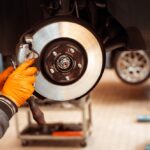
Importance of Regular Tire Inspections
Tires are one of the most critical components of your vehicle, responsible for providing traction, stability, and control on the road. However, many drivers overlook the importance of regular tire inspections, risking their safety and vehicle performance. In this comprehensive guide, we’ll highlight the importance of regular tire inspections and the key role they play in ensuring road safety and vehicle maintenance. Whether you’re a seasoned driver or a novice, understanding the significance of inspecting your tires is essential for a smooth and safe driving experience.
Understanding Tire Inspections
What are Tire Inspections?
Tire inspections involve visually examining the condition of your tires to identify any signs of wear, damage, or irregularities. This includes checking tire tread depth, sidewall condition, tire pressure, and overall tire health.
Why are Tire Inspections Important?
Regular tire inspections are crucial for several reasons:
- Safety: Well-maintained tires are essential for safe driving. Inspections help detect potential tire issues that could lead to blowouts, tread separation, or loss of control while driving.
- Performance: Properly inflated and balanced tires contribute to better vehicle performance, including improved handling, fuel efficiency, and braking distance.
- Durability: Timely tire inspections can help extend the lifespan of your tires by identifying and addressing issues early on, such as uneven wear or alignment problems.
Signs of Tire Wear and Damage
Tread Wear
Tire tread provides the necessary traction for driving on various road surfaces. Signs of tread wear include uneven tread depth, bald spots, and excessive wear on the edges of the tire. Inspecting your tread regularly helps ensure adequate grip and traction, especially in wet or slippery conditions.
Cracks and Bulges
Inspect the sidewalls of your tires for signs of cracks, bulges, or blisters, which can indicate internal damage or weakness. These issues can compromise the structural integrity of the tire and increase the risk of a blowout, particularly at high speeds.
Tire Pressure
Maintaining the correct tire pressure is essential for optimal vehicle performance and safety. Check your tire pressure regularly using a tire pressure gauge and ensure it matches the recommended pressure specified by the manufacturer. Underinflated or overinflated tires can affect handling, fuel efficiency, and tire wear.
Benefits of Regular Tire Inspections
Enhanced Safety
Regular tire inspections help identify potential safety hazards such as worn tread, punctures, or low tire pressure, reducing the risk of accidents and blowouts on the road. By addressing these issues promptly, you can ensure a safer driving experience for yourself and others.
Improved Performance
Well-maintained tires contribute to better vehicle performance, including improved handling, traction, and fuel efficiency. By inspecting your tires regularly and addressing any issues, you can optimize your vehicle’s performance and enjoy a smoother and more comfortable ride.
Cost Savings
Proper tire maintenance can help extend the lifespan of your tires and reduce the need for premature replacements. By detecting and addressing issues early on, such as uneven wear or alignment problems, you can avoid costly repairs and replacements down the line.
Tips for Effective Tire Inspections
Schedule Regular Inspections
Make it a habit to inspect your tires at least once a month or before long road trips. Pay attention to signs of wear, damage, or irregularities, and address any issues promptly to ensure optimal tire performance and safety.
Use the Penny Test
Use the penny test to check your tire tread depth periodically. Insert a penny into the tread grooves with Lincoln’s head facing downward. If you can see the top of Lincoln’s head, it’s time to replace your tires due to insufficient tread depth.
Maintain Proper Tire Pressure
Check your tire pressure regularly using a tire pressure gauge and inflate your tires to the recommended pressure specified by the manufacturer. Insufficient tire pressure can lead to decreased fuel efficiency, uneven tire wear, and poor handling.
Conclusion
Regular tire inspections are essential for maintaining road safety, vehicle performance, and durability. By inspecting your tires regularly and addressing any issues promptly, you can ensure optimal tire health and enjoy a safer and more enjoyable driving experience. Don’t overlook the importance of tire maintenance—take proactive steps to keep your tires in top condition and stay safe on the road. Your safety and the safety of others depend on it.
Need a Mechanic in Lubbock, TX?
Since 1975, M & M Tire and Service Center has been the premier provider of general automotive repairs in the Lubbock area. We are a family-owned and operated business with over 40 years of experience. Our friendly and professional staff work to provide quality repairs and services at reasonable prices. At M & M Tire and Service Center, we offer oil changes, brake servicing, suspension repair, tires, electrical system analysis, heating and air conditioning, engine repairs, doors and windows and safety inspections. Call us today to schedule your next appointment and see why the Better Business Bureau has given us an A+ rating since 1983.
More...
Categorised in: Tire Services
This post was written by admin





